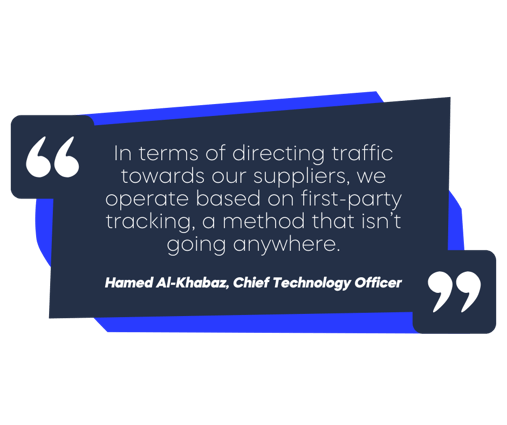Addressing Google’s Third-Party Cookie Phase Out for Travel Bloggers
A significant change taking place is Google's decision to completely phase out third-party cookies by August 2024, with 1% already removed. Third-party cookies have long been the crumb trail that digital ads and brands rely on to understand and engage with their users. Browsers are tightening the lid on privacy, and third-party cookies are going away. But what does this all really mean? We’re here to break down what the end of third-party cookies means, and importantly, how this impacts our partners’ affiliate revenue.
Why are 3rd-party cookies being phased out?
Third-party cookies have been key in letting advertisers track users' online activities across websites and serve personalized ads. However, privacy concerns have led to increased scrutiny over the use of third-party cookies. Google's response, prioritizing user privacy, is to remove these cookies from Chrome, the web browser used by 63.6% of internet users worldwide.
What’s the difference between 1st-party cookies and 3rd-party cookies?
A first-party cookie is created by the website owner when you visit their website. It's like leaving a small note in your browser so that when you return, it can recall your previous visits. This allows the website to remember your preferences, such as your preferred language or the items you placed in your shopping cart.
A third-party cookie is placed by someone other than the website owner (a third party), often advertisers, to track users as they visit different websites, so they can show ads that are relevant to their interests across the web.
Will this change affect my Stay22 revenue?
It's unlikely.
The lack of third-party cookies should not fundamentally impact our partners' capacity to earn affiliate revenue, as this relies on first-party cookies. Hamed Al-Khabaz, Chief Technology Officer and Co-founder of Stay22, provides some clarity:

"In terms of directing traffic towards our suppliers, we operate based on first-party tracking, a method that isn’t going anywhere. While certain supply partners have transitioned to 'Server-to-Server' tracking methods, and others have moved away from cookie reliance altogether, our foundational tracking methods remain solid."
When your site directs a booking to a supplier, Stay22 is equipped to accurately track and process your commission, just as we always have. Frederic Aouad, Chief Commercial Officer, adds:
"While we anticipate that the phasing out of third-party cookies will not drastically alter our tracking capabilities, we are attentively monitoring the situation. Should any notable changes arise, our commitment is to keep our partners fully informed and to navigate any adjustments together."
In essence, we approach this shift with optimism, backed by a strong framework designed to sustain your earnings throughout these changes.

What will change at Stay22?
While Stay22's affiliate operations mostly use first-party cookies, third-party cookies have played a role in tracking unique site visits. The impending phase-out may change how visits are counted, potentially affecting conversion rate calculations without impacting actual bookings.
Currently, if one person visits your site 5 times in an hour, that's recorded as a single unique visitor, not 5 visitors. With the disappearance of third-party cookies, it will become more difficult to differentiate between the two. The same issue arises when a user switches devices when browsing.
In addition, the phase-out challenges the way Stay22 tests and optimizes its product offerings. To counter this, Stay22 is looking into solutions like Chrome's Privacy Sandbox, InsightArc, and ID5, which all provide legal and privacy-respecting methods for third-party tracking.
“We are currently working on implementing this feature so that there will be a smooth transition during the phase-out in August.” Hamed explains, “It's crucial for us to nail this right, so our affiliate partners can continue to see their revenues climb.”
Will this change affect my ad network revenue?
At this stage of the phase-out, 1% of Chrome users are navigating without cookies. This group contributes approximately 30% less revenue than those with cookies enabled. The digital advertising sector is exploring alternatives to address this challenge, including creating closed ecosystems ("walled gardens"), encouraging user logins, and developing new identifiers. Despite these efforts, the industry faces significant uncertainty, particularly the decline in retargeting effectiveness and its impact on conversion rates and profits.
For website owners who primarily depend on advertising revenue, now is a crucial time to consider diversifying income sources. Affiliate marketing presents a more stable and reliable option compared to traditional advertising.
For those who are already using affiliate marketing, switching to Stay22 could be a strategic move. Our tools, such as Optimized Redirect and Nova, are designed to enhance booking rates, offering a safety net in these changing times.
Google's phase-out of third-party cookies is a clear signal that the future of digital marketing lies in privacy-respecting practices. Amidst these changes, Stay22 remains dedicated to developing solutions that respect user privacy and support the success of our affiliates. We are confident about the future and believe that we can navigate these shifts and achieve continued growth together.


